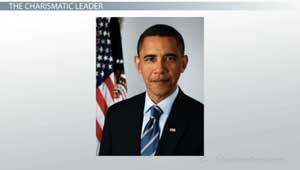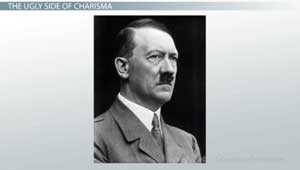The Charismatic Leader
After you watch the video and know the material, click HERE for the quiz.
Have you ever noticed how some people seem to excel at being liked? Those people have what we call charisma. In this lesson, you'll explore how that charisma can be applied in a business management setting
What is Charisma?
Imagine back to when you were in high school for a second. It's gym class, and your PE instructor has told you that you'll be playing dodge ball. Team captains have been selected by the instructor and were told to take turns picking teammates. You remember what that was like… sitting there just waiting to be picked, hoping that you had done enough to prove that you were one of the best picks. Whether for skill or popularity, the reason didn't matter; you just hoped that you were one of the first to be selected by either team captain.
A simple fact of life is that we all want to be liked enough to be picked quickly, and we cringe at the possibility of being the last one chosen. This really applies to many facets of our lives; as humans we naturally desire to be liked, admired, and appreciated by others. Some people are better at attracting others, and no, I'm not talking sexually. Rather, some have what can be considered a magnetic persona about them that really draws people to them out of pure admiration.
Perhaps you know someone like that. In your personal life it might be the person you always want to invite out with you or who you trust with your deepest secrets; in business, it's the person who's able to solicit favors, motivate others, and close even the most challenging of deals.
 |
The Charismatic Leader
One area where people with charisma are especially effective is leadership. Charismatic leaders use their magnetic personalities and charm to gather followers. They are dominant, self-confident individuals who hold strong conviction for their beliefs. The charismatic leader's influence is the result of his or her referent power.
 |
Think about some of your heroes and why you admire them and want to be just like them. Subordinates are willing to follow the charismatic leader because of the way that they are treated by the leader, not because of their formal title or position in the organization. The charismatic leader will spend time getting to know each of his or her subordinates, making them feel valued and, at times, one of the most important employees they have.
Charismatic leaders are able to create a vision of the desired future and convince followers that they are the ones who will be able to take them to that future state. The charismatic leader shows each of the followers their optimistic role in this desired future, making them more than willing to support the leader's efforts. Followers trust the charismatic leader and quickly succumb to his or her wishes.
 |
The Ugly Side of Charisma
While charisma can be highly desirable leadership attribute, it is also one of the most dangerous. Charisma is a powerful thing. It can break down barriers and make even the most impossible circumstances suddenly seem possible. The charismatic leader is aware of his or her influence on others and, if not properly motivated, can be a serious problem.
 |
Think Adolf Hitler: he was an extremely charismatic leader but had very bad motives. Nevertheless, he was able to create a massive army who carried out his evil plan.
In the business environment, the charismatic leader whose focus is on him- or herself, and not on the organization, can have disastrous consequences. Because subordinates are so willing to follow the charismatic leader, they can be blindly led into aiding the leader in his or her own personal pursuits for power, recognition, and advancement long before they realize it. Taking the focus off of organizational goals and putting it towards the charismatic leader's goals can cripple an organization in the following ways:
- Accountability is diminished
- People associate success with the leader, making them highly dependent on him or her
- Decision-making (both large and small) is delayed
- The organization loses its ability to be resilient during times of change
Instead of empowering followers, leaders make them dependant on themselves, often micromanaging tasks and preventing them from taking on even greater responsibility and accountability in their own jobs. Charismatic leaders are often regarded as champions of organizational success, but that charm can be both a blessing and a curse for an organization if motives are misplaced. If you have a charismatic leader in your organization, or if you practice a charismatic leadership style, make sure your objectives are pure and put the goals of the organization before any personal ones. Charismatic leaders who exhibit appropriate values and use their charisma for the betterment of the organization serve as good role models for others.
Lesson Summary
Let's review. Charismatic leaders use their magnetic personalities and charm to gather followers.
 |
Charismatic leaders are often regarded as champions of organizational success, but that charm can be both a blessing and a curse for an organization if motives are misplaced. Subordinates can be led blindly into aiding the leader in his or her own personal pursuits for power, recognition, and advancement. Taking the focus off of organizational goals and putting it towards the charismatic leader's goals can cripple an organization in the following ways:
- Accountability is diminished
- People associate success with the leader, making them highly dependent on him or her
- Decision-making (both large and small) is delayed
- An organization loses the ability to be resilient during times of change
However, charismatic leaders who exhibit appropriate values and use their charisma for the betterment of the organization serve as good role models for others.